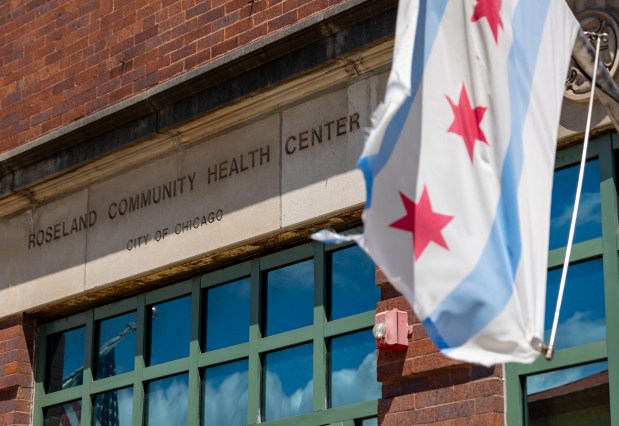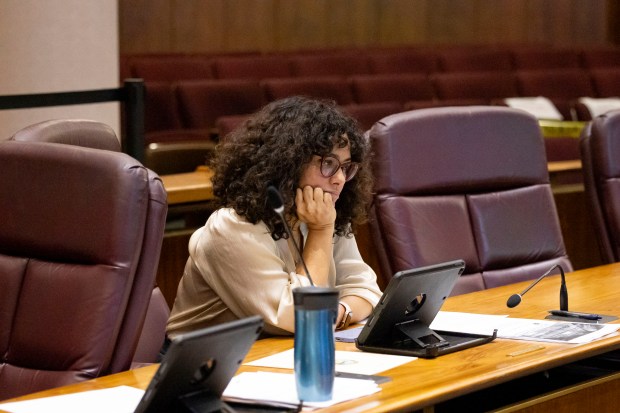Mayor Brandon Johnson is expanding city-run mental health services at three locations across Chicago, a decisive step to fulfill the so-called Treatment Not Trauma plan he pushed during his campaign.
Johnson is set to announce the moves Thursday morning outside the city’s closed Roseland clinic on the Far South Side, now set to reopen by the end of the year. The city will also add mental health services to a Chicago Department of Public Health clinic in Pilsen in August and inside the Legler Regional Library in West Garfield Park as soon as June, according to a plan the Johnson administration shared with the Tribune.
The move comes more than a decade after former Mayor Rahm Emanuel closed six of the city’s 12 public mental health clinics. Emanuel’s decision sparked fiery protests by patients and union members who lost jobs at those clinics, which developed into a campaign that has badgered Chicago’s politicians ever since.
After former Mayor Lori Lightfoot backed away from her own campaign promise to reopen clinics, activists have apparently found their champion in Johnson. His plan to broadly expand the city’s mental health resources in large part by reopening clinics offers “a path for us to begin reversing decades of disinvestment,” he said in a report announcing the plan.
The mayor cited the memory of his brother, Leon, who he said struggled with mental illness and died addicted and homeless.
“I believe a commitment to mental health and to treating individuals experiencing trauma and not criminalizing them would have extended his time on this Earth,” Johnson said. “For me this work is personal.”
The three expansions are the first clear-cut plans from Johnson’s administration to execute the campaign promise. They mark a new direction in mental health care for Chicago after past administrations sharply cut the city’s use of publicly-operated clinics and instead funded private mental health care often carried out by nonprofit providers.
A report prepared by the working group Johnson launched through the City Council in October lays out the administration’s vision for the policy.
In a draft copy of the report shared with the Tribune, the working group made up of administration officials, first responders, clinicians and community organizers shared plans for the city to gradually, but dramatically expand its mental health care by opening new clinics and growing its non-police behavioral health crisis response teams. Five city-run clinics remain open. It isn’t clear exactly how many more Johnson plans to add beyond the three sites he will announce Thursday, but the report said there is support for further expansion.
Johnson’s team had shared few details about its Treatment Not Trauma plan in recent months, leading some supporters of the campaign to fear the administration would tone down their sweeping vision. Their ideas go far beyond a few clinic reopenings and include calls for the creation of a “community care corps” of workers tasked with proactively preventing mental health crises.
But the Thursday announcement drew high praise from Ald. Rossana Rodriguez-Sanchez, 33rd, Treatment Not Trauma’s chief City Council proponent. The close Johnson ally called the mayor’s plan a “new beginning for mental health care in the city of Chicago.” Efforts to push Lightfoot to expand city-run mental health services went nowhere for years, Rodriguez-Sanchez said.
“We were met with a lot of opposition and rejection to these ideas. Finally seeing that it’s moving, that we are being able to deliver on the demands we have been making for so long, it’s a beautiful thing,” she said. “This is just the beginning.”
Rodriguez-Sanchez said the city’s past pivot to funding private mental health providers was less sustainable than a public system because it led to worse working conditions and a reliance on impermanent grants.
“In that model, we lose a lot of the things that make us able to deliver the actual care that people need,” she said.
Some nonprofit mental health care providers have criticized the plan, expressing concerns it will take away city funding for their work and that the expense of the additional city-run bricks-and-mortar clinics Johnson proposes will make it harder to provide as much care as people around the city need.
The clinic reopenings are a long-held goal of the American Federation of State, County and Municipal Employees, a strong Johnson labor ally whose members lost jobs when Emanuel shuttered six city-run clinics in 2011.
The AFSCME International Union PAC contributed $100,000 to Johnson’s mayoral campaign last year, according to state campaign finance records. And AFSCME Illinois Council 31’s PAC contributed $56,750 to Johnson in 2018 during his successful run for Cook County commissioner.

The city has already altered the CDPH’s slow hiring processes to add around 20 clinical workers since January to staff the three expansions, according to the report.
The Johnson administration has far more work to do to make community groups’ full hopes for Treatment Not Trauma a reality, Rodriguez-Sanchez said. It took decades for the city to so decisively shrink the city’s public mental health care system, she said.
“Reversing that will take a while, but we have started,” she said. “They definitely showed us that there is a will to expand public services, to expand public care.”
In November, Johnson included $5.2 million in his first budget earmarked for opening up new clinics. His administration plans to ramp up spending on alternative response and clinical services from $21.4 million in 2024 to $36.5 million in 2026, according to the report.
The report does not identify where the added funding will come from, but offers possibilities such as better Medicaid reimbursement, new grants and money from the city’s general fund. It focuses on ways to cut costs as more clinics are reopened, such as layering mental health services into other city-run facilities, including schools and libraries.
While the push from community groups for reopenings has often been tied to specific sites shuttered by past administrations, the city may ultimately pick future locations based on where the greatest need is now, the report said.
“The solution to this harm is not always as simple as merely reopening those centers,” it said. “Simply put, what worked in 2012 may not work today,”
The report also lays out a plan to grow the city’s Crisis Assistance Response & Engagement (CARE) program. The program, piloted by Lightfoot and expanded by Johnson, uses a new branch of first responder teams to respond without police to non-violent emergencies such as overdoses and mental health crises. CARE teams should get more emergency calls, be able to work in more areas and be able to respond to more kinds of emergencies, the report said.
The city should also consider creating around-the-clock mental health clinics and building out a new training academy grow a larger workforce for the expanding public mental health care system, the report said.
jsheridan@chicagotribune.com



